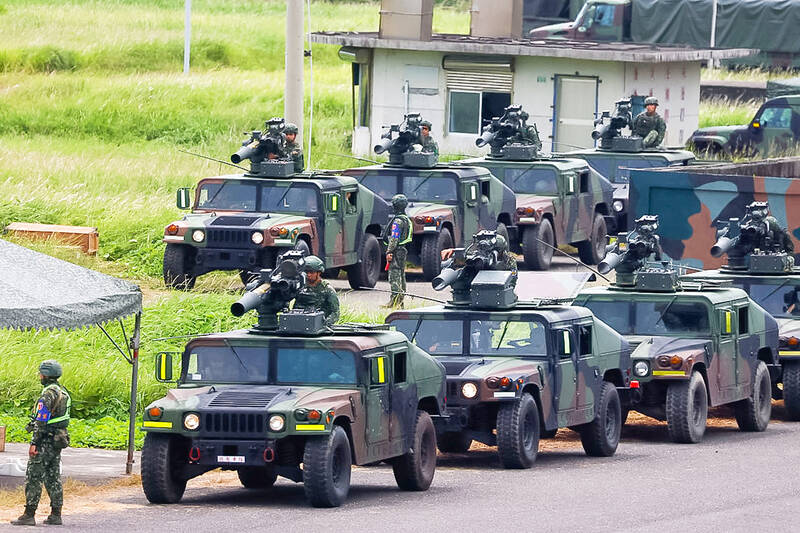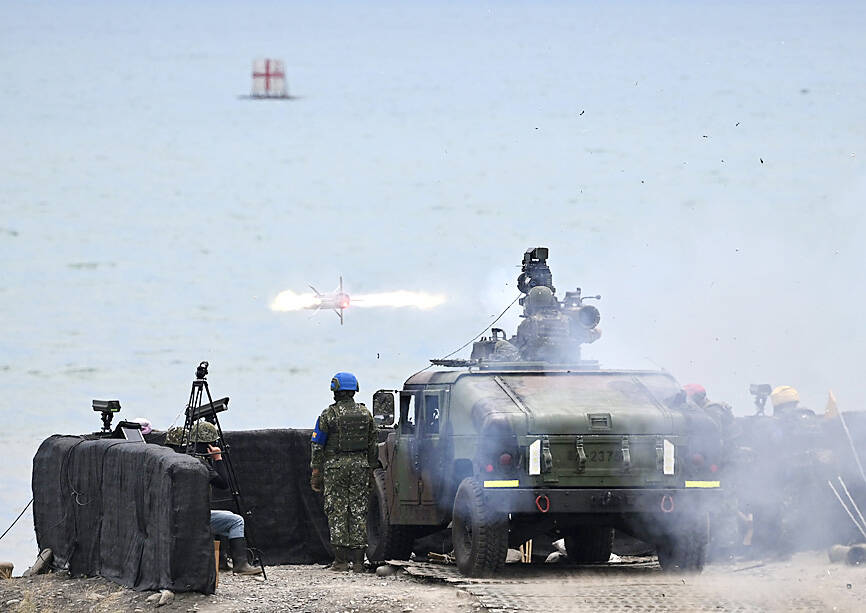The military yesterday held live-fire exercises involving precision weapons in Pingtung County to test troops’ capabilities to counter potential amphibious and sea attacks by China.
The “Sky Horse” exercises were open to the media and involved troops from the army’s 542nd, 564th, 269th and 234th brigades, Hualien Defense Command, Army Infantry Training Command and the 99th Marine Brigade.
During the drills, soldiers fired TOW 2A anti-tank missiles at targets in the sea from a coastal drill area in Fangshan Township (枋山).

Photo: Ann Wang, Reuters
Major Huang Chieh-hung (黃介宏), an instructor from the Army Infantry Training Command who was in charge of the drill, said the soldiers used sighting devices to boost the missiles’ accuracy, adding that about 70 percent of the projectiles hit their designated targets at sea.
The major difference between this year’s Sky Horse exercise and previous ones is that TOW 2B anti-tank missiles were fired from vehicles instead of from the ground, he said.
Firing missiles from a vehicle increases mobility and helps soldiers defend against enemy attacks by engaging effectively at an early stage, Huang added.

Photo: Lo Pei-de, Taipei Times
Taiwan has purchased 1,240 TOW 2B anti-tank missiles, 24 Humvee armored vehicles upon which the missiles would be mounted and 30 targeting systems from the US, the Ministry of National Defense has said.
The weapons are to be delivered by 2025, the ministry said.
The military also held a live-fire exercise involving helicopters and Thunderbolt-2000 rocket systems at a separate drill ground in Pingtung.
Today, the armed forces are to hold live-fire exercises that would involve Avenger air-defense systems and Stinger surface-to-air missiles.
The drills come against the backdrop of aerial and naval maneuvers by China in and around the Taiwan Strait.
Last month, eight Chinese warplanes approached Taiwan’s contiguous zone — or the band of sea within 24 nautical miles (44km) of its coast.
In May, China’s Shandong aircraft carrier group sailed through the Taiwan Strait in a rare voyage.
Additional reporting by AFP

The Ministry of Economic Affairs has fined Taobao NT$1.2 million (US$36,912) for advertisements that exceed its approved business scope, requiring the Chinese e-commerce platform to make corrections in the first half of this year or its license may be revoked. Lawmakers have called for stricter enforcement of Chinese e-commerce platforms and measures to prevent China from laundering its goods through Taiwan in response to US President Donald Trump’s heavy tariffs on China. The Legislative Yuan’s Finance Committee met today to discuss policies to prevent China from dumping goods in Taiwan, inviting government agencies to report. Democratic Progressive Party Legislator Kuo Kuo-wen (郭國文) said

The Ministry of Economic Affairs has fined Taobao NT$1.2 million (US$36,900) for advertisements that exceeded its approved business scope and ordered the Chinese e-commerce platform to make corrections in the first half of this year or its license would be revoked. Lawmakers have called for stricter supervision of Chinese e-commerce platforms and more stringent measures to prevent China from laundering its goods through Taiwan as US President Donald Trump’s administration cracks down on origin laundering. The legislature’s Finance Committee yesterday met to discuss policies to prevent China from dumping goods in Taiwan, inviting government agencies to report on the matter. Democratic Progressive Party

Taiwan and its Pacific ally Tuvalu on Tuesday signed two accords aimed at facilitating bilateral cooperation on labor affairs, according to Taiwan’s Ministry of Foreign Affairs (MOFA). The governments inked two agreements in Taipei, witnessed by Foreign Minister Lin Chia-lung (林佳龍) and visiting Deputy Tuvaluan Prime Minister Panapasi Nelesone, MOFA said in a news release. According to MOFA, the agreements will facilitate cooperation on labor issues and allow the two sides to mutually recognize seafarers’ certificates and related training. Taiwan would also continue to collaborate with Tuvalu across various fields to promote economic prosperity as well as the well-being of their

Sung Chien-liang (宋建樑), who led efforts to recall Democratic Progressive Party (DPP) Legislator Lee Kun-cheng (李坤城), was released on bail of NT$80,000 today amid outcry over his decision to wear a Nazi armband to questioning the night before. Sung arrived at the New Taipei District Prosecutors’ Office for questioning in a recall petition forgery case last night wearing a red armband bearing a swastika, carrying a copy of Adolf Hitler’s Mein Kampf and giving a Nazi salute. Sung left the building at 1:15am without the armband and covering the book with his coat. Lee said today that this is a serious